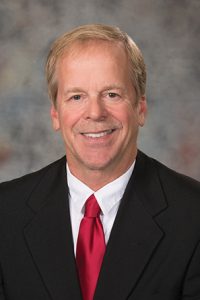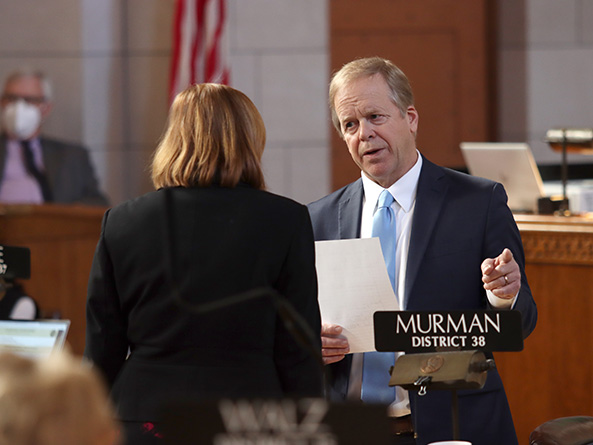Cap on school district property tax increases stalls
A proposal to limit annual increases in the amount of property taxes collected by public school districts stalled Feb. 8 after a failed cloture motion.
Under LB986, introduced by Sen. Tom Briese of Albion, a district’s property tax request — the amount of taxes requested to be raised through its levy — could not exceed its property tax request authority, which the state Department of Education would calculate annually.
A district’s property tax request authority would increase each year by 2.5 percent or the percentage increase in the Consumer Price Index for all Urban Consumers, whichever is greater. It also could increase based on growth in student enrollment or the number of limited English proficiency students or poverty students.
The resulting amount then would decrease by an amount equal to the increase in a district’s non-property-tax revenue, which includes certain state sources. If revenue from those sources decreases, a district’s property tax request would increase by an equal amount.
Briese said most school districts have held their property tax request increases to a “reasonable” 3.4 percent over the past four years, but some outliers have increased theirs at a higher rate. LB986 would protect taxpayers from extreme increases while allowing school boards to override the limit if they have a good reason, he said.
The limit would not apply to the portion of a district’s property tax request needed to pay the principal and interest on approved bonds, and a district could carry forward unused property tax request authority to future years.
LB986 would allow a 75 percent majority of a school board to exceed a district’s property tax request authority by 4 to 7 percent depending on the number of students enrolled. A district also could exceed its property tax request authority by an amount approved by 60 percent of legal voters at a special election.
A pending Revenue Committee amendment would replace the bill.
Elkhorn Sen. Lou Ann Linehan, the committee’s chairperson, said the amendment would allow a district’s property tax request authority to grow by a three-year average annual percentage increase in the CPI to account for spikes in inflation. She said it also would clarify that a district’s non-property-tax revenue would not include grants and donations.
Linehan supported LB986, saying the proposed limit is “more like a warning flag” than a lid on school taxing authority because school boards could override it in an emergency.
She said the measure is intended to slow the growth in school property tax requests to ensure that they do not outstrip what the state spends on various property tax relief programs.
“This is not trying to hurt anybody or tie somebody down,” Linehan said. “It’s just trying to make sure that the billion dollars we’re now doing on property tax relief actually results in property tax relief.”
Sen. Matt Hansen of Lincoln opposed the bill and introduced an amendment that would strike its main provisions. Although school boards could vote to override the limit, he said, LB986 would allow smaller districts to exceed their property tax request authority by a higher percentage than larger districts.
This would unfairly limit fast-growing districts like Lincoln Public Schools, Hansen said.
Also in opposition was Lincoln Sen. Adam Morfeld, who said local school board members are responsible for their district’s tax asking and spending decisions. If voters disagree with those decisions, he said, they will hold board members accountable at the next election.
Sen. Lynne Walz of Fremont also opposed LB986, saying school boards generally are financially responsible. She said it would be “appropriate and prudent” for lawmakers first to understand why a few school districts have higher property tax increases than others before imposing a limit on all districts.
“Not knowing or really understanding why a school may be over or under budget authority is a concern,” Walz said.
Briese said he would introduce an amendment on select file to address a concern that his proposal would limit a district’s overall revenue growth and affect school districts differently depending on how much state aid they receive.
Rather than cap property taxing authority, he said, the amendment would limit school districts’ total state and local revenue growth. That approach would limit tax asking increases, allow taxing authority to “float” with fluctuations in state aid and eliminate disparities among districts, Briese said.
After eight hours of general file debate over several days, Briese filed a motion to invoke cloture, which would end debate and force a vote on LB986 and any pending amendments.
The motion failed on a vote of 28-21. Thirty-three votes were needed. A failed cloture motion results in debate on a proposal ceasing for the day. The bill is unlikely to be placed on the agenda again this session.


